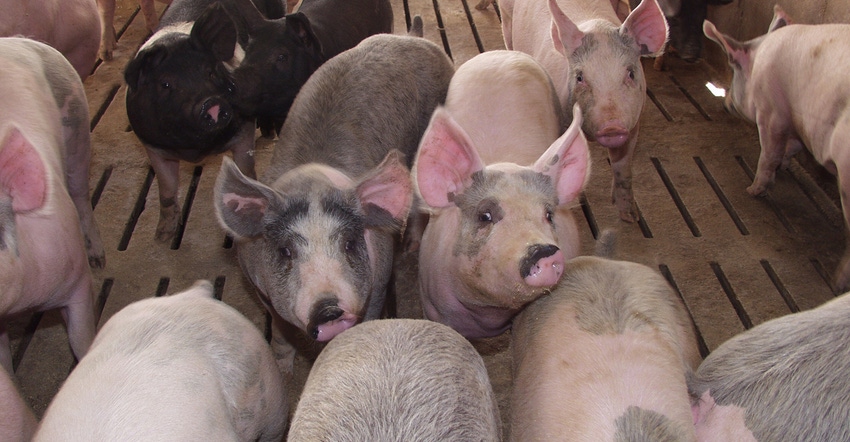High concentrations of malondialdehyde, a marker of lipid peroxidation, were only observed following long-term exposure to high environmental temperatures.
December 5, 2019

Heat stress has serious negative consequences on pig production performance, causing significant economic losses. High-temperature conditions negatively affect growth performance, increase respiration rate and rectal temperature, reduce intestinal barrier integrity and function, reduce meat quality, and cause oxidative stress.
We hypothesized that supplementation of vitamin E or polyphenols could enhance growth performance and intestinal health by improving antioxidant status and alleviating negative effects of oxidative stress associated with heat stress. Thus, we conducted a study to evaluate the effects of vitamin E or polyphenols supplemented in the feed or in the drinking water of finishing pigs housed under heat stress.
We used 128 individually housed pigs weighing an average of 104 pounds. Pigs were assigned to either thermo-neutral rooms that had an average temperature of 70.2 degrees F or heat-stressed rooms that had an average temperature of 87.6 degrees F. Within each environment, pigs were given four supplementation treatments consisting of either:
a control diet containing 25 IU/kg vitamin E as dl-α-tocopheryl acetate;
the control with 100 IU/L of vitamin E (d-α-tocopherol) supplemented via the drinking water;
the control with 200 IU/kg of additional vitamin E (dl-α-tocopherol acetate) in the feed; and
the control supplemented with a blend of polyphenols in the feed.
Supplementation was started seven days before implementing the temperature treatments and heat stress was applied for a total of 28 days.
Heat stress significantly reduced final body weight of pigs by 16.3 pounds, reduced average daily gain by 26.7%, decreased feed intake by 25.4% and worsened feed efficiency by 6.8% (Table 1).

As expected, heat stress increased respiration rate and rectal temperatures. The addition of vitamin E or polyphenols in the feed or in the drinking water did not improve growth performance of pigs housed under heat stress or thermo-neutral conditions, nor did the addition of these antioxidants impact respiration rate or rectal temperatures. Supplementation of vitamin E in the drinking water or feed increased serum and liver concentrations of vitamin E, regardless of environmental temperature.
Vitamin E supplementation in the water was more effective in increasing serum (especially after prolonged supplementation) and liver vitamin E concentrations than supplementation in the feed. Supplementation with polyphenols did not impact vitamin E concentrations in serum or liver.
The addition of vitamin E in the feed increased the villus to crypt ratio in the jejunum. Likewise, cellular proliferation of enterocytes was increased when supplementing vitamin E in either feed or water in the pigs exposed to heat stress. These results suggest that vitamin E may play a role in improving the histology and cell proliferation in the intestine. Immune status (cytokines) measured in serum was not affected by heat stress, but the concentration of tumor necrosis factor-α in the jejunum and in the ileum was decreased by heat stress. Moreover, in the ileum, the addition of vitamin E in the drinking water decreased tumor necrosis factor-α, suggesting reduced inflammatory response, but no effects were detected due to supplementation of polyphenols.
Heat stress causes oxidative stress, which can be measured by malondialdehyde (a marker of lipid peroxidation) in serum or intestinal tissue. In our experiment, high concentrations of malondialdehyde were only observed following long-term exposure to high environmental temperatures. Moreover, lipid peroxidation as measured by malondialdehyde was increased when using dietary vitamin E and polyphenols during heat stress in the ileum, but not when using vitamin E in the drinking water.
Results of our study showed that heat stress markedly reduced growth performance of finishing pigs and that supplementing antioxidants in feed or water was generally not effective in alleviating the impact of severe heat stress on performance of pigs.
Sources: Eric van Heugten and Ysenia Silva-Guillen, who are solely responsible for the information provided, and wholly own the information. Informa Business Media and all its subsidiaries are not responsible for any of the content contained in this information asset.
You May Also Like



